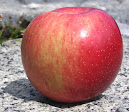If only we could store electricity, we wouldn't waste so much of it or want to burn so much coal and oil and gas for times when the sun doesn't shine and the wind doesn't blow.
Now come five scientists who propose developing "cheap and powerful carbon-based active materials for Na-ion batteries."
From apples.
Writing in this month's ChemElectroChem, a European electrochemistry journal, the authors of "Apple-Biowaste-Derived Hard Carbon as a Powerful Anode Material for Na-Ion Batteries" propose apples as an economical source of sucrose-derived hard carbon, a component of sodium-ion batteries.
Sodium batteries, in turn, are a promising alternative to more-expensive lithium batteries.
For carbon, the authors' attention is drawn to
apples that are regarded unsuitable for market because of their “under-sized, malformed, and unevenly colored” character, according to, as an example, EU marketing standards.... Therefore, large amounts of apples are rejected directly after harvest in the EU and further use as feed for cattle is often obviated by rapid spoilage of the fruit."
Other researches have investigated peanut shells and pomelo peels as sources of hard carbon for the negative electrode in sodium batteries.
Wu, Liming, Daniel Buchholz, Christoph Vaalma, Guinevere Giffin, and Stefano Passerini. 2016. "Apple-Biowaste-Derived Hard Carbon as a Powerful Anode Material for Na-Ion Batteries" ChemElectroChem 3(2) 292–98.


Who knew it could be apples that would save us? That's brilliant news!
ReplyDelete